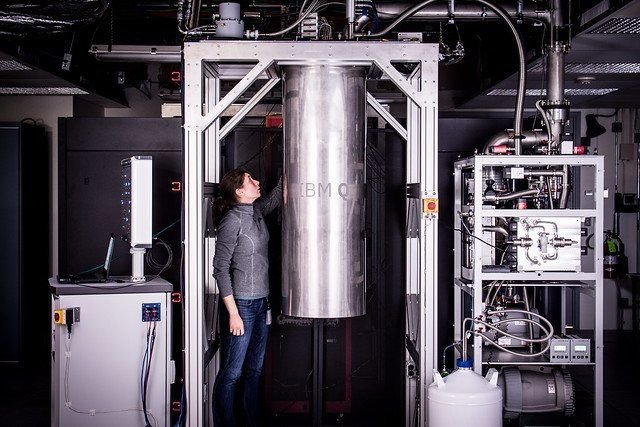IBM Unveils the Most Powerful Quantum Computer Yet
IBM has announced that its 14th quantum computer, its most powerful to date, will be available to customers starting in October. At its core, the system has 53 qubits of processing power. That's a big leap up from the IBM Q System One it debuted this past January, which had 20 qubits of processing power.
Quantum computing often sounds confusing. That's because it is—and it doesn't help that we don't really use the things it deals with in our daily lives. On the flip side, classical computing, which allows you to read this article on a variety of devices, is seen and used by hundreds of millions of people every day.

Classical computing uses bits, or pieces of data stored as zeroes and ones. Quantum computing happens at the atomic level and uses quantum bits, called qubits, which can use zeroes, ones, and any number in between. That allows them to solve problems with greater efficiency.
"The new quantum system is important because it offers a larger lattice and gives users the ability to run even more complex entanglement and connectivity experiments," says Dario Gil, director of IBM Research, in a press statement.
“The single goal of this passionate community is to achieve what we call Quantum Advantage, producing powerful quantum systems that can ultimately solve real problems facing our clients that are not viable using today’s classical methods alone, and by making even more IBM Quantum systems available we believe that goal is achievable.” Gil adds.
But what exactly will that look like?
The lattice is an example of how IBM is trying to transition quantum computing from the realm of academia and research into practical uses. According to the company, lattice cryptography would use "high dimensional geometric structures to hide information, creating problems that are considered impossible to solve without the key," even by other quantum computers. That means data and information would be able to stay hidden underneath unsolvable math problems.
Quantum computing processes data faster than classical computers because qubits are more efficient carriers. That means they could handle large amounts of data in hopes of solving big problems. German automaker Volkswagen, for example, is currently researching quantum computing models in hopes they can "precisely predict future traffic volumes, demand for transport, and the duration of each journey." Hypothetically, a quantum computer would be able to accept vast amounts of data from city inhabitants and analyze their patterns to reduce traffic time.
Wherever there are complex problems with many sides and possibilities to consider all at once, quantum computing has potential.
https://www.popularmechanics.com/technology/a29105270/most-powerful-quantum-computer/
Hi! I am a robot. I just upvoted you! I found similar content that readers might be interested in:
https://www.msn.com/en-us/news/technology/ibm-unveils-the-most-powerful-quantum-computer-yet/ar-AAHy1TI